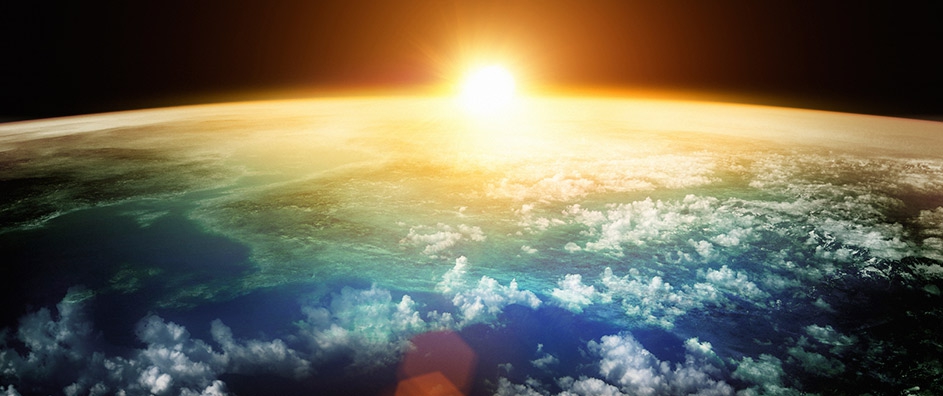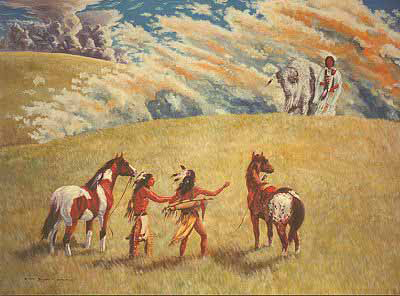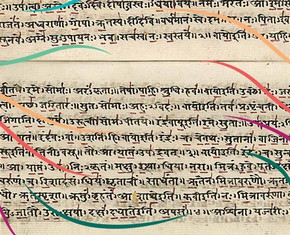The views expressed in our content reflect individual perspectives and do not represent the authoritative views of the Baha'i Faith.
Continuing our conversation about Native American messengers of God and the indigenous Faiths they brought, let’s take a look at how the Baha’i teachings answer the question, “Were Messengers of God sent to North America?” Here’s Abdu’l-Baha’s response to that important question:
Undoubtedly, in those regions, the Call of God must have been raised in ancient times, but it hath been forgotten now.
Chris: Paula, do you agree that, here, Abdu’l-Baha takes a definitive position on this question, not only by answering in the affirmative, but emphatically by using the intensifying adverb, “undoubtedly”?
Paula: First, I would like to comment on the “Call of God” which “hath been forgotten now.” This is another of those points I had to work on. My immediate response was we Native Americans have not forgotten the call of God, or our messengers of God. In working through this I came to the realization that the statement “it hath been forgotten now” is not just in reference to Native Americans—it is a universal statement for all of humanity:
… the Manifestations of His Divine glory and the Day Springs of eternal holiness have been sent down from time immemorial, and been commissioned to summon mankind to the one true God. That the names of some of them are forgotten and the records of their lives lost is to be attributed to the disturbances and changes that have overtaken the world. – Baha’u’llah, Gleanings From the Writings of Baha’u’llah, p. 174.
After I read this passage from the Baha’i writings and realized we were not singly being pointed out, this lost its emotional hold on me. I then realized I myself did not know the name of the Manifestation or the sacred Message, prior to White Buffalo Calf Woman. I only knew some of the previous Indigenous Manifestations of God and Messages through ceremonies and songs.
But yes, in Abdu’l-Baha’s answer the use of the adverb, “undoubtedly” strikes me as a definitive position. And there is huge importance in this, toward bringing about recognition of our Native Messengers of God. This is a much-needed step toward healing the past.
The history of religious and spiritual persecution of Native Americans is entrenched in murder, massacre and forced assimilation. Most people don’t realize that, while the rest of the population of the United States enjoyed religious freedom, Native Americans were denied this basic right. It was not until 1978 that we received a partial freedom of religion. This has created a wound far deeper than most can imagine, and denying our Sacred Messengers makes this wound even deeper.
Chris: So is it your understanding that Abdu’l-Baha states messengers of God were sent to Native Americans, Native Canadians and Native Mexicans (long before there were any borders separating the United States, Canada and Mexico) and, most likely, to the indigenous peoples of the Americas (including Central and South America) as well?
Paula: I find it illogical to think or believe otherwise.
Chris: Here’s my last question: Since the indigenous peoples of the Americas have long believed that the Great Spirit, down through the centuries, has sent wisdom teachers to guide them, then why is this statement by Abdu’l-Baha so significant to you, as a Cherokee, Shawnee, Delaware, Seneca and Lakota Baha’i?
Paula: I am stunned and hurt by how frequently people have told me they cannot accept the fact that Native peoples had messengers/manifestations of God. This kind of thinking perpetuates the antiquated, racist idea of Native people as soulless heathens in need of salvation. This to me represents an unconscious sense of superiority. How many years will it take to arrive at the equality of the human race and unity in diversity? Even without Abdu’l-Baha’s Tablet to Amir Khan, many other Baha’i writings tell us God has sent messengers to all people. So let’s close with those beautiful quotes:
God hath raised up Prophets and revealed Books as numerous as the creatures of the world, and will continue to do so to everlasting. – The Bab, Selections From the Writings of the Bab, p. 125.
Unto the cities of all nations He hath sent His Messengers. – Baha’u’llah, Gleanings From the Writings of Baha’u’llah, p. 145.
©2014 by Christopher Buck.
You May Also Like
Comments


















I love everything but this statement here, everything else is well supported. this needs much deeper explanation as far as I understand it. and I, personally, have never forgotten the oppression and forced segregation of my native brothers. not for one single second. and I am undoubtably assured ...that those who have forgotten are waking up. :) if not fast enough I blame only myself for not teaching more. :)
The Master tells us “The East has ever been the dawning point of the Sun of Reality. All the Prophets of God have appeared there. The religions of God have been promulgated, the teachings of God have been spread and the Law of God founded in the East. The Orient has always been the centre of lights.” ...From The Promulgation of Universal Peace, page 289
“All the Prophets of God have appeared there.” leaves no room for Prophets of God, the capitalization of “Prophets” indicating Manifestations of God, to have other terrestrial origins. Thus, for a Manifestation of God to have appeared on the North American continent, He must have come from Asia. The Master made note of possible crossings from Asia to the Americas. The above indicates that there would have been no Manifestations of God born in the Americas.
"As to places whose people were not informed of the appearance of Prophets, such people are excused. In the Qur’án it hath been revealed: 'We will not chastise them if they had not been sent a Messenger' (Q. 17:15)
"Undoubtedly, in those regions, the Call of God must have been raised in ancient times, but it hath been forgotten now.”
Here the Master clearly states that in some places the peoples were not informed of the appearance of Prophets. Further, the Master notes that such places “had not been sent a Messenger.” Yet, even if those peoples had not been sent a Messenger, nevertheless, “the Call of God must have been raised in ancient times, but it hath been forgotten now.” What then is the Call of God? It cannot be the appearance of a Prophet, because the Master has already told us no Prophet had gone to those regions. If not a Prophet, that is, a Manifestation of God, then the Call of God might have come through the peripatetic ministry of a devout follower of a Manifestation of God, not the Manifestation of God Himself. This hypothetical ‘apostle’ might have crossed over into North America long ago. However, the words of the apostle, and the name of the Manifestation he represented, have been forgotten. The Guardian supports this hypothesis in a letter dated 25 November 1950, written on behalf of Shoghi Effendi to an individual believer:
"It is possible the Indians of the Americas were influenced in the remote past by Prophets in Asia. But again, as there is nothing in our teachings about it we cannot do more than speculate."
In a May 1996 letter to Mr. Buck, the Research Department of the Universal House of Justice noted the following regarding the “Call of God”:
The “Call of God”
The Persian term translated as “Call of God” in the above Tablet is “nidáy-i-Iláhí”. This term appears frequently in the Tablets of ‘Abdu’l-Bahá with differing shades of meaning. By way of illustration, we provide the following examples from Selections from the Writings of ‘Abdu’l-Bahá (Haifa: Bahá’í World Centre, 1982), each of which contains the expression “nidáy-i-Iláhí”, though the English translations differ:
Section 15, page 31: “… for this did Bahá’u’lláh raise up the call of the Lord”.
Section 195, pages 234–235: Referring to the influence of opposition to the Faith on its dissemination, ‘Abdu’l-Bahá asks: “How else could His summons have been heard in the continents of America and of Africa the dark?”
Section 219, page 274: “Although ye dwell in western lands, still, praise be to God, ye did hear His call from out the east and, even as Moses, did warm your hands at the fire kindled in the Asian Tree.”
Section 225, page 283: Describing the “Two calls to success and prosperity”, ‘Abdu’l-Bahá indicates that the second “is the soul-stirring call of God”, which, He explains, “is founded upon the instructions and exhortations of the Lord and the admonitions and altruistic emotions belonging to the realm of morality which, like unto a brilliant light, brighten and illumine the lamp of the realities of mankind. Its penetrative power is the Word of God.”
From these several examples, it is suggested that while the “Call of God” is clearly “founded” upon the teachings of the Manifestation of God, being in the physical presence of the Manifestation is but one means by which people become informed of “His summons”.
Your rich traditions of worship and, dare I say, rituals (rituals are natural to the human experience and enhancing) must, when paired with your Baha'i life, only serve to make your experience all the richer.
By happy happenstance, I happened to see your latest comment. (Authors on BahaiTeachings are not automatically notified of comments, but the editors are working on this.)
I've seen “White Buffalo Calf Woman Song.” And I'm aware of over 25 “ceremonial songs in the Lakota language.”
But your statement — “the most authentic repository of information on the Lakota spiritual heritage is found in the text of the 100’s if not 1,000’s of songs inspired through the dispensation of Ptehíŋčala Ska Wiŋ.... many of the songs are attributed directly to Her!” — is a stunning revelation to me! ...
I had no idea that there was this wealth of spiritual tradition ascribed to White Buffalo Calf Maiden. So this is important!
To use a Haudenosaunee (Iroquois) term, are you considered to be a Faith-keeper? Are you at liberty to disclose these Lakota sacred songs? If so, I would honored and privileged to be able to study them.
I am also honored and privileged to know you, even though from a distance. I will never forget when you came to Millikin University in Decatur, Illinois (do you recall the date?), when I was teaching there as an assistant professor of religion, from 1997 to 1999. You made a profound impression on me then, and the several times that I've seen you perform sacred hoop dances since, my admiration has deepened.
My esteemed co-author, Paula Bidwell, wrote: “It is my hope that other Native people will submit articles. We have a voice with BahaiTeachings.”
And so I would be greatly honored and privileged — and I'm sure our readers would be most interested — if you would kindly agree to be interviewed by me for a series of BahaiTeachings articles.
If so, would you please email me directly, so that we can get started?
P.S. I tried posting this same reply well over an hour ago, but it did not appear, which is why I am posting my reply again in a different place (here).
Do you think Tunka Wakan Win is why we used to say Tunkasila for Creator instead of Wakan Tanka? I remember being told that Tunkasila was our original word and when the Christian missionaries came they thought we were idolators worshipping a rock and it caused a lot of problems, so the people decided to use Wakan Tanka.
Also, I only know one of the really old songs and it's so old that it can't be translated, which might present a possible issue for attempting an academic perspective...?
This might make a good research project for some aspiring student of comparative religion? I have analyzed the content of these songs through my own personal lens and have arrived at quite a few personal conclusions. It would be great to gain a more academic perspective!
Of course, I respect your idea here. Yet doesn't the idea of the return of White Buffalo Calf Maiden transcend gender?
Your late, illustrious mother, Patricia Locke, who was inducted into the U.S. National Women’s Hall of Fame in 2005, believed that Baha'u'llah was the "return" of White Buffalo Calf Woman, didn't she?
That said, the Maiden of Heaven is a metaphorical personification/alter ego/spiritual reality of Baha'u'llah, as Dr. Nader Saiedi (Taslimi Professor of Baha’i Studies, UCLA) explains in this BT article: "God, the Divine Feminine and the Maid of Heaven" (July 11, 2014): ...
___________
The Arabic verb referring to “the Maid of Heaven begotten by the Spirit of Bahá” is waladatnī, namely, “She gave birth.” In Arabic, verbs are different for female and male. “Walad” means: “He begot.” “Waladat” means: “She begot.”
So there is no doubt that, in this statement, “Bahá” is defined as the mother. The literal translation is that “Bahá” is the female who gave birth to the Maid of Heaven. So it is not deduction. It is the literal word.
___________
Regarding White Buffalo Calf Maiden's prophetic predecessors, this is new information to me! Thank you for sharing this! Can you tell us more about Tȟuŋkáŋ Wakȟáŋ Wiŋ/Holy Stone Maiden and Wanáȟča Wašte Wiŋ/Beautiful Flower Maiden? Better still, how about writing an article for Bahai Teachings and include it in this series of articles on Native Messengers of God?